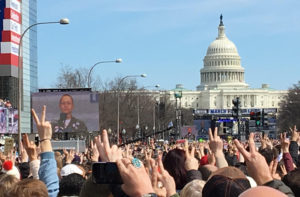 Lent began with 14 kids returning to dust. On Ash Wednesday, 19-year-old Nikolas Cruz walked into Marjory Stoneman Douglas High School in Florida and shot and killed 14 students and three teachers. He did this with an assault rifle that he had legally purchased one year before. This man, whose name (translated “cross”) bears the image of an instrument of death, that day bore another instrument of death — like a cross, a device created and designed exclusively for killing — and reminded us all that we are dust.
Lent began with 14 kids returning to dust. On Ash Wednesday, 19-year-old Nikolas Cruz walked into Marjory Stoneman Douglas High School in Florida and shot and killed 14 students and three teachers. He did this with an assault rifle that he had legally purchased one year before. This man, whose name (translated “cross”) bears the image of an instrument of death, that day bore another instrument of death — like a cross, a device created and designed exclusively for killing — and reminded us all that we are dust.
Lent is a season for lament, a time to reckon with death, a moment to remember our sins. We see the world around us, the world that we have made, full of violence and pain, and we begin to believe those who say that nothing can be done, or that the only way to stop the violence is with more of it. But we also remember that Christ’s death on the cross defeated death itself — “O Death, where is your victory?” — and, thus, the need to kill to secure life more abundant. Christians, simply put, are not to take up arms. Those who live by the gun, evidence suggests, die by it. The Prince of Peace, by submitting to death, broke the cycle of violence once and for all; “If my kingdom were from this world, my followers would be fighting,” he said (John 18:36). Lent reminds us that too often we have found ourselves lured to the wrong kingdom, following the wrong king.
In the kingdoms of this world, politicians respond to school shootings with their usual litany of “thoughts and prayers,” the solemn assemblies of our era, the offerings that God rejects, hates, despises (Amos 5). Like the figure in the book of James, who upon seeing a hungry beggar blesses him with a prayer — “Peace be with you” — but fails to give him something to eat, these politicians offer superficial pieties, cheap condolences. God responds, “What is the good of that?” (James 2:16). Lament without justice, faith without works, words without action are dead, buried beneath the bodies of the 30,000 victims of gun violence each year. God does not require these self-serving sacrifices and offerings, the platitudes and pieties of our post-shooting rituals, but an open ear, the psalmist says (40:6). For those who have ears to hear, God is speaking — not in the wind, with an earthquake, or by fire, not in the halls of power, either, but through the voices of school children, the survivors, whose mourning has turned to marching.
As the season of Lent turned to Holy Week and Jesus turned to go up to Jerusalem, many of us heeded the call of these survivors. We gathered in our capital city for the March for Our Lives on Palm Sunday weekend. But this time our palm branches were protest signs. And this reminded us that those first century palm branches were also signs of resistance — welcoming a king who came in peace, in protest of King Herod who wielded the violence of a cross. Both are signs that true power does not rest in the hands of a tyrant or the barrel of a gun but in a servant on a lowly donkey and the voice of a child.
Standing before the nation’s Capitol, child after child led us to envision a world at peace, where the wolf lies down with the lamb, the leopard and the kid, the lion and the calf, to imagine a time when we “will not hurt or destroy” anymore (Isaiah 11:6-9). Poised and determined, they submitted simple, and reasonable, policy demands: raise the minimum age to purchase firearms to 21, ban assault weapons and high-capacity magazines, and instate universal background checks. Even more, they proclaimed a beloved community, not just of school-shooting survivors, but those affected by police shootings of unarmed black men, people of color whose voices drift unnoticed in the political clamor.

Photo: Steven Chewning
This was a multichromatic congregation singing the songs of peace and hope, preaching the words of righteousness. One of the movement’s most prominent leaders, 17-year-old Emma Gonzalez, held a moment of silence for the six minutes and 20 seconds it took Cruz to shoot his victims. Nearly one million people stood silent, echoing the silence of the Holy Week to come — the silence of the sleeping disciples in the Garden, the silence of Jesus before Pilate, the silence of Holy Saturday when all hope seems lost. Yet, as she stood with a mixture of grief and defiance, the crowd began to raise their hands in the sign of peace, two fingers extended toward the heavens. This was the gentle defiance of Easter morning. This was the Resurrected One’s call to not be afraid, to tend his lambs, to follow the little children as they come to him. Death lost its victory in the gathering of a community committed to peace, demanding for its nation to beat its guns into plowshares.
I’m tired of writing about the times that others embody what it means to be church better than the church itself. I did so after the white supremacist rally in Charlottesville last summer; I do so again now. There were thousands of Christians gathered at the March, and I know of several congregations that marched together. But when American Christians resist reasonable gun control measures at a higher rate than the American public, we have lost our way. When we proclaim the words of a constitutional amendment louder than the words of a first-century sermon on a mountainside, we blaspheme. When we prove time and again through our silence that we value an instrument of death over the nonviolent kingdom of God, God turns to those who will listen. God has done it before; God will do so again, until those of us who proclaim to follow the Prince of Peace will listen and repent and believe.
